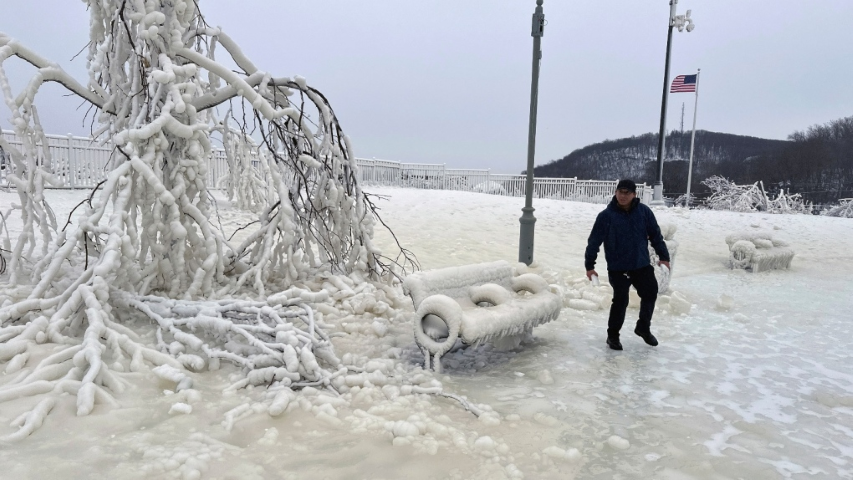
The mist from Great Falls has turned the area around the waterfalls in Paterson, N.J., into a frozen spectacle on Thursday, Jan. 18, 2024. Despite the extremely cold temperatures and slippery paths, people are venturing out to see the trees, benches, and lampposts covered in ice. (Photo credit: AP Photo/Ted Shaffrey)
In a sweeping winter onslaught, the United States faces perilous conditions from Montana to northern Florida as freezing temperatures and brisk winds persist, with the region slated to remain frosty until Monday. The bitter cold, typically absent in the southern U.S., introduces a risk of frostbite and hypothermia, particularly as wind chill temperatures plummet to single digits in areas like the Florida Panhandle. Some regions, including parts of Kansas, may experience temperatures feeling as low as minus 30 degrees Fahrenheit due to a blend of frigid Canadian air and wind.
The menace of frostbite and hypothermia looms large as wind chill intensifies. Extended exposure, especially for the homeless, raises the likelihood of hypothermia, a condition where the body's energy depletes, leading to a drop in temperature. Preceding storms have already claimed 55 lives, many attributed to hypothermia-related incidents, such as a fatality in Tennessee involving an overturned space heater.
Frostbite, though less severe, poses another concern. To avert it, individuals venturing outdoors are advised to don layers, two pairs of socks, a warm hat, face protection, and insulated mittens. Staying hydrated and abstaining from alcohol is also recommended. In Atlanta, officials have designated two locations to provide shelter during the frigid weekend.
Beyond personal safety, the cold weather threatens water pipes, prompting warnings in Memphis, Tennessee, where broken mains led to water contamination concerns. Residents in the southern U.S. are advised to protect outdoor pipes and allow faucets to trickle to prevent freezing.
The use of home heating systems during winter storms poses a risk of carbon monoxide poisoning, emphasizing the importance of ventilation. Generators and vehicles should not be operated indoors to avoid this deadly gas. Treacherous road conditions, compounded by black ice, have prompted cautionary measures, urging people to avoid unnecessary travel and exercise vigilance when driving or walking.
Animals, too, are at risk in freezing temperatures. The American Society for the Prevention of Cruelty to Animals recommends keeping pets indoors during extreme cold, as cars can act as refrigerators. Outdoor animals should have access to shelter and unfrozen water, with extra care for paws exposed to rock salt. Swift action is crucial in cleaning up antifreeze spills to prevent poisoning.
As the winter chill maintains its grip, these precautionary measures become paramount for safeguarding lives and ensuring resilience against the elements.















